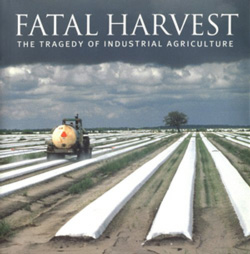DominionSections
Browse Articles
- IndependentMedia.ca
- MostlyWater.org
- Seven Oaks
- BASICS Newsletter
- Siafu
- Briarpatch Magazine
- The Leveller
- Groundwire
- Redwire Magazine
- Canadian Dimension
- CKDU News Collective
- Common Ground
- Shunpiking Magazine
- The Real News
- Our Times
- À babord !
- Blackfly Magazine
- Guerilla News Network
- The Other Side
- The Sunday Independent
- Vive le Canada
- Elements
- ACTivist Magazine
- The Tyee
- TML Daily
- New Socialist
- Relay (Socialist Project)
- Socialist Worker
- Socialist Action
- Rabble.ca
- Straight Goods
- Alternatives Journal
- This Magazine
- Dialogue Magazine
- Orato
- Rebel Youth
- NB Media Co-op
Radio
Harvest Goon
November 10, 2003
Harvest Goon
Fatal Harvest: The Tragedy of Industrial Agriculture: Review

"A must-read for anyone who eats in the 21st century."
Far from being the wholesome, harmless industry that the media makes it out to be, the authors of Fatal Harvest demonstrate that modern agriculture is perhaps the biggest threat to water, soil, biodiversity, cultures and communities around the globe. With over 250 striking photos and 40 essays from leading thinkers, farmers and activists such as Wendell Berry, Helena Norberg-Hodge, Vandana Shiva and Wes Jackson, Fatal Harvest calls on citizens to become "paradigm warriors" in the fight against the industrial worldview and the destruction that is resulting.
The book is divided up into seven sections. The first, entitled "Farming As If Nature Mattered" questions the principles of industrial agriculture and proposes an alternative agrarian paradigm. The industrial worldview, Fatal Harvest argues, holds profit as its first priority, viewing nature as a set of limits on productivity and efficiency which can be overcome by science. The agrarian alternative considers humans' connection to the land (which exists, whether or not we are conscious of it) and takes community, sustainable land use and biological diversity as its priorities. These opposing modes of thought are visually contrasted in Part Three. Here, striking side-by-side photo layouts compare agrarian and industrial landscapes for everything from apples, to cotton, to wheat. With these photos readers are guided "...past the deceptive facade of modern farms, which make them appear as healthy, thriving, lush and productive into a visual understanding of the destructive and deadly 'monocultured' reality of current food production."
According to the creators of the book, this 'deceptive facade' has been maintained with millions of corporate advertising dollars dedicated to the message that farming today is not only better than ever, but an absolute necessity in today's world. The second section of the book is therefore devoted to debunking the myths which promote and defend industrial agriculture. Among the 10 myths "debunked" in this section are that industrial agriculture will feed the world, and the idea that industrial agriculture is cheap. According to the editor of Fatal Harvest "...hunger is not created by lack of food but by poverty and landlessness, which deny people access to food." and "if you added the real cost of industrial food-its health, environmental, and social costs-to the current supermarket priced, not even our wealthiest citizens could afford it." When all costs are calculated, Fatal Harvest argues, small-scale intensive farms are more efficient than industrial ones. The next three sections fill out this argument with essays on the environmental and social costs of the new technologies, farming methods, and globalization, associated with industrial agriculture.
The final section, "Organic and Beyond," looks to the future of farming. The editor warns the reader against the temptation of seeing "simply organic" as enough, by allowing large corporations to cash in on the growing popularity of chemical free food: "If organic production ends up mimicking conventional agribusiness (huge, faraway operations minus the chemicals, with centralized distribution and processing) what becomes of the independent, regionally-and quality-oriented, stewardship-minded farmer?" The essays in this section not only stress the importance of innovative alternatives to industrial farming (from urban gardens, to farming with the wild), but also stress the urgency of replacing a system that gives so much power to corporations willing to sacrifice all other values for increased short term profit.
Fatal Harvest is not simply a book about food, but also a book about life. By honouring the relationships between food, family, money, community, power, health and war, Fatal Harvest reminds us that many things start at the breakfast table. Fatal Harvest is a must read for anyone who eats in the 21st century.
* * *
Fatal Harvest: The Tragedy of Industrial Agriculture is edited by Andrew Kimbrell and published by Island Press with a listed cost of $45.00. If you have the cash, it's worth every penny; otherwise, try the library!
Related articles:
By the same author:
Archived Site
The Dominion is a monthly paper published by an incipient network of independent journalists in Canada. It aims to provide accurate, critical coverage that is accountable to its readers and the subjects it tackles. Taking its name from Canada's official status as both a colony and a colonial force, the Dominion examines politics, culture and daily life with a view to understanding the exercise of power.